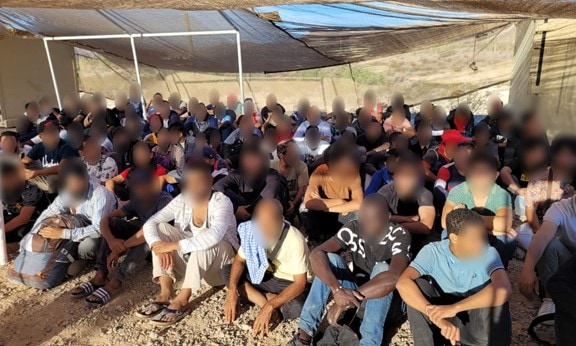The report is horrible to contemplate. A major Western human rights organization reports that Saudi border troops may have killed hundreds of Ethiopian migrants attempting to enter the Kingdom's borders from Yemen.[1] Whatever the details or context of this particular case turn out to be, the upshot is that here was a country that would defend its borders aggressively, with deadly force. Despite frequent criticism of American and European border policies, that rarely happens with those countries.

If anything, the border defenses of the EU and the USA resemble a sieve more than a wall. Almost seven million migrants have flooded north across the Mexico-United States border since Joe Biden became President in January 2021. Monthly encounters by the US Border Patrol with migrants are at record highs. Migration flows into Europe are also high. 20,000 – mostly young men from Algeria, Morocco, Senegal and Mali – have entered Spain in small boats this year alone.[2] "Irregular" migration into the United Kingdom is up 17 percent, with 85 percent of them arriving in small boats from France.[3] Twice as many migrants have arrived in Italy by sea this year – 113,500 – than had at the same time last year.[4]
Saudi Arabia is unusual in being so aggressive but is not alone. Syrian migrants trying to cross in Turkey have also been shot dead. African migrants coming into South Africa from other countries have been massacred. Some advanced countries seem to avoid migration pressure by virtue of policies that value ethnic homogeneity and exclude foreigners, Japan and South Korea (two countries with very low fertility rates) are two examples, but such a stance seems impossible in the West.
While economic globalization may have hit a rough spot since COVID, migration flows have recovered as the pandemic has ebbed. Migrants to the West – and their Western progressive advocates – have learned how to manipulate and bend laws and global humanitarian conventions to their benefit.[5] Strange new pathways have sprung up, with Mauritanians utilizing cheap tickets across the Atlantic and temporary visas to the Nicaraguan regime of dictator Daniel Ortega as a stratagem to enter the United States.[6]
And while large percentages of those coming into the United States and Europe are unaccompanied, and often poorly educated, solitary males, the flows are not limited to the poor or destitute. A 2022 poll found that 43.9 percent of Nigerian doctors want to emigrate, 91.3 percent of them said that they wanted to do so because of poor renumeration at home.[7] African, Latin American and Filipino priests have filled positions in Catholic parishes in America and Europe facing a severe shortage of local clergy.[8]
Much of the rhetoric about this subject has been deeply polarizing. Many see it as an unalloyed good, essentially as essential labor flows going to where they are needed most. In Spain, the leftist government has promoted migration with the idea that these newcomers will pay the pensions of Spain's future elderly population. Others have decried these migration flows as a disaster, as a flood that seeks to replace the native population with foreigners or a phenomenon that brings crime and instability. 46 percent of those condemned for sexual assault in Spain are of foreign origin.[9]
While President Biden noted that America will soon have a "minority White European" population by 2040, Black residents and politicians in Chicago and New York City have decried the sudden arrival of large numbers of migrants.[10] The United States is the largest global recipient of international migrants (India is the largest sender of migrants).[11]
Rather than decry or applaud, I wanted to mention some likely trends on how migration will change both the United States and Europe. Some trends are obvious: the United States will be more Hispanic and the EU will be more Islamic in coming years.
One change that will affect the United States in ways many do not seem to have fully comprehended will be the slow, steady erosion of Black political power in the United States. Urban areas that were once uniformly Black and that produced political figures likes Jesse Jackson and Barack Obama will become more foreign-born and "browner." In a trend already seen in Miami decades ago, Spanish speaking newcomers will gradually seek and secure greater representation in these cities, replacing local elites. That tension has already been on display in Los Angeles and Chicago where Blacks try to hold on to power as the numbers – and eventual voting power – of the newcomers continues to rise.[12] The 2020 U.S. Census revealed a considerable increase in Blacks abandoning these urban areas in the North for smaller towns, the suburbs and even the South.[13]
Diversity rules created in the West, particularly the United States, means that "diverse" arriving foreign populations will gain some benefits over locals, not just local Whites but local non-Whites. It is an interesting irony that the offspring of Indian Brahmins and Latin American oligarchs will likely be considered as part of the "oppressed" diverse population of the United States, worthy of preference in both public and private sectors, once they hit America's shores.
Another development to watch will be the perhaps volatile combination of ethnic and generational politics. One of the justifications in the West for increased migration flows is that they are needed to prop up the welfare state, including paying for the elderly.[14] But, at least initially, this will mean the working young largely drawn from the new arrivals supposedly paying for the elderly from the original population, an unstated, and untested, social and generational bargain.
Still another consequence, although perhaps not entirely unintended, will occur not in the West but in the countries where migrants are fleeing from. While the brain drain is an obvious issue, an even more important result will be the export of political dissent. Here Cuba with its more than 60 years of "exporting" its political opposition was an early model.[15]
SUPPORT OUR WORK

Expect to see the same trends of using migration as a political safety valve happening in regions like North Africa and the Middle East. The result will be regimes that will be even more calcified and resistant to change than before, like the sclerotic regime in Cuba. Instead of plotting for revolution at home, the desperate and dissatisfied will plot how to leave.[16] They may be losing young people and some well-educated sectors of the population – a trend that will hurt in the future – but regimes in Algeria and Cairo will be strengthened by encouraging their hotheads to emigrate. Less population and less unhappy populations will mean less pressure to change.
Ironically, these migration flows are likely to weaken democratic tendencies in the sending countries while placing greater stress on democratic processes in the receiving countries. This is especially true in nations where the elite is much more in favor of unrestricted migration than the voting public.[17]
Exporting their critics will help these sending regimes. But they will also, paradoxically, create populations in foreign countries that not only send remittances home, but that create powerful "lobbies" – on the street, in terms of street muscle – in Europe as we have seen with Turkish Grey Wolves[18] in certain regions and urban toughs from Algeria in France who still retain fervent, idealized loyalties to the land they, or their parents, came from.
Many are familiar with second-generation Muslim migrants being susceptible to Jihadist propaganda, but many others were susceptible to regime propaganda in ways to contribute to instability and discord in the West, not just terrorism.[19] During the recent riots in France, the Algerian dictatorship postured as being not only the "moral guardian" of Algerian migrants, but also of their descendants.[20]
These trends are already occurring now, even before climate change migration becomes a major global cause.[21] The hard edges and friction caused by these historic population flows will no doubt lead to other, less foreseen, challenges in the near future. One of the major challenges for Western governments will be to manage this issue which is not only an administrative and technical task but also a deeply political and divisive one.
Alberto M. Fernandez is Vice President of MEMRI.
[1] Hrw.org/report/2023/08/21/they-fired-us-rain/saudi-arabian-mass-killings-ethiopian-migrants-yemen-saudi, August 21, 2023.
[2] Gaceta.es/espana/mas-de-20-000-inmigrantes-ilegales-han-entrado-en-espana-en-lo-que-va-de-ano-20230827-1434, August 27, 2023.
[3] Gov.uk/government/statistics/irregular-migration-to-the-uk-year-ending-june-2023/irregular-migration-to-the-uk-year-ending-june-2023, August 24, 2023.
[4] Reuters.com/world/europe/italy-struggles-with-spike-migrant-arrivals-2023-08-28, August 28, 2023.
[5] Abcnews.go.com/International/wireStory/eus-top-court-hungary-broke-law-forcing-migrants-100298844, June 22, 2023.
[6] Africanews.com/2023/08/21/mauritanian-migrants-explore-new-routes-to-the-united-states, August 21, 2023.
[7] human-resources-health.biomedcentral.com/articles/10.1186/s12960-022-00788-z, accessed August 29, 2023.
[8] Catholicherald.co.uk/africas-priests-are-disappearing-in-europe, August 20, 2023.
[9] Theobjective.com/espana/2022-10-02/agresion-sexual-espana-extranjeros, February 10, 2022.
[10] Abc7chicago.com/migrants-chicago-migrant-shelters-crisis-deputy-mayor-beatriz-ponce-de-leon/13553392, July 26, 2023.
[11] Pewresearch.org/short-reads/2022/12/16/key-facts-about-recent-trends-in-global-migration, December 16, 2022.
[12] Politico.com/news/magazine/2021/12/07/chicago-black-population-decline-523563, July 12, 2021.
[13] Politico.com/news/magazine/2021/12/07/chicago-black-population-decline-523563, July 12, 2021.
[14] Vox.com/2018/8/1/17561014/immigration-social-security, October 23, 2018.
[15] Theguardian.com/world/2019/jun/19/cuba-dissidents-exile-human-rights, June 19, 2019.
[16] Arabbarometer.org/wp-content/uploads/ABVII_Migration_Report-EN.pdf, July 2022.
[17] Cnews.fr/france/2022-11-17/sondage-39-des-francais-estiment-que-les-migrants-sont-une-menace-pour-la-france, November 17, 2022.
[18] See MEMRI Inquiry & Analysis No. 1622, Turkey's Grey Wolves Organization – An Arm Of President Erdoğan's Governing Coalition – Fights In Syria, Azerbaijan, Praises Chechen Terrorist Shamil Basayev, Runs Branches In U.S., Europe, February 9, 2022.
[19] Lemonde.fr/en/le-monde-africa/article/2023/07/03/french-riots-echo-in-the-maghreb-france-continues-to-marginalize-generations-of-immigrants_6042018_124.html, July 3, 2023.
[20] Youtube.com/watch?v=wh9erbsPxIg&t=38s, accessed August 29, 2023.
[21] News.gallup.com/poll/468218/nearly-900-million-worldwide-wanted-migrate-2021.aspx, January 24, 2023.




